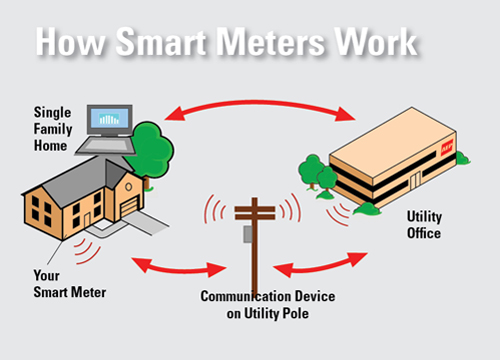

| Online: | |
| Visits: | |
| Stories: |
Beware the ‘Smart’ Meter agenda
Pretty soon you’ll be offered a “smart meter”, with all sorts of sales talk about the benefits and savings it will deliver. But smart meters may not be all good news. The Mail on Sunday has an interesting article pointing out that there are serious flaws in their design, and that many problems have not been resolved with these expensive systems.
There’s a happy, smiley marketing campaign which advises consumers of the benefits of the system — “helping the consumer” to understand how to reduce electricity use and therefore lower bills, and so on. But they don’t discuss the risks: the wireless system may not be robust; it may be vulnerable to malicious hacking; the programme nationally will cost £11bn; and it indeed may change the way consumers are billed — but not in the way the energy companies and government are selling the idea.
One concern is that demand at times of “peak load” may be “managed”, either by switching supplies off, or by expanding time-of-day pricing beyond the day rate/Economy 7 system which is now in place (and which makes sense, given the spare base-load capacity a night).
Here is the spin that Which put on it, for instance:
“Smart meters also offer the possibility for more flexible energy tariffs in the future – such as improved ‘time-of-day tariffs’
offering cheaper rates at off-peak times to smooth out national energy use through the day.”
But the corollary of “offering cheaper rates at off-peak times” is of course, “offering more expensive rates at peak times”. That offer is not attractive if you’re elderly and need heat when you’re cold, or if you’re a working family with children that need to be fed and showered before school in the midwinter — peak time.
Steve Holliday, CE of the Grid, that “We need to balance demand for energy with supply. That gets into smart metering, so if we need to interrupt power supply for a few hours during the day when you’re not at home, that’s okay.”
Elsewhere, he said that consumers were going to have to get used to the idea of only using electricity when it was available, and implied that some (poorer) people may be offered deals that would not guarantee continuity of supply, but could be interrupted, as is the case with energy intensive industries currently. At best, the smart meter would force people living on a budget to wander over to the smart meter to see if they can afford to put the kettle/TV on.
A paper by Alex Henney and Ross Anderson suggests that Miliband “cooked the books” when multiple cost-benefit analyses showed that smart meters would produce a net disbenefit to consumers.
As with so many issues we face in the UK, smart meters are driven by an EU directive, as well as by UK energy policy. The government should come clean and admit that smart meters can be used against the interests of the consumer. The key point here that this expensive way of managing demand was made necessary by the failure to take the need for secure and affordable energy seriously, resulting in the loss of capacity through into the 2020s. These problems are exacerbated by over-reliance on expensive and intermittent renewables. Now the consumer faces the consequences: demand managed by prices and the energy companies’ ability to switch off the lights.
Posted on July 8, 2014by rogeroffice
Source: http://tapnewswire.com/2017/04/beware-the-smart-meter-agenda/




